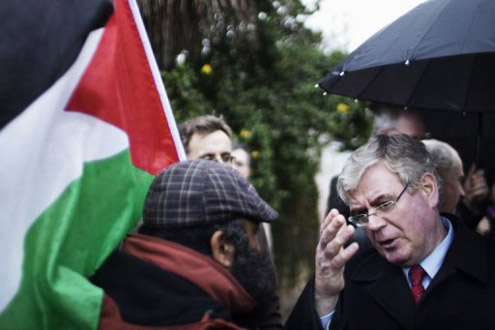![]()
By Rob Harris
Eamon Gilmore, Ireland’s foreign minister, said recently he shall seek a boycott of Jewish West Bank settlements throughout the European Union:
Tánaiste Eamon Gilmore has said Ireland may push for the EU to ban goods from Israeli settlements if Israel does not quickly change its settlements policy in Palestinian territories.
Furthermore, Gilmore also seeks the banning of some Jewish settlers from entering the EU due to “violence”:
Mr Gilmore has also said the Government may seek to have certain extremist settlers banned from the EU if they do not stop their violence in settlement areas. […]
“I think at that stage if there isn’t a change in Israeli policy in relation to settlements in particular, I think we may have to look at some additional measures,” the Tánaiste said.
These “additional measures” are largely left unsaid but if he wishes to censure settler communities then it is possible they will be treated in a similar fashion to terrorist organisations. He may suggest proscribing settler advocacy groups, individuals convicted of violence against Palestinians, and even those associated with activism. Somewhat similar ideas were proposed by EU diplomats in an official report last year, concerning “settlers” in East Jerusalem.
The statement is of note as Gilmore said he spoke for the Government, and their policy will be pursued further when Ireland gets the rotating EU presidency next January. Additionally, Gilmore holds more than the foreign ministry. By possessing the role of Tánaiste (deputy prime minister) in the current government, he stands as the second most senior politician in Ireland. He is also the leader of the Labour Party, partners in the two-party coalition government.
The EU’s frequent criticism of the Jewish State attempts to appease the Arab-Islamic world. It is also an opportunity to appear holier than thou, and to date Europe’s hostility toward Israel has resulted in a substantive amount of prejudicial hot air over human rights, which has contributed in a gradual albeit very significant way to Israel’s delegitimisation.
However, the present boycott proposal should be deemed a more intensive immediate threat, judging by overall trends in EU policy toward Israel, and European trends at a more national level, such as with the UK and Denmark, to isolate produce associated with Jewish settlements. Goods produced in the settlements have no entitlement to any EU import exemptions, unlike the rest of Israel.
The timing of Gilmore’s proposal
Gilmore announced his boycott proposal on May 14th, immediately after a meeting with his European ministerial counterparts, where he may have discussed the idea. The meeting led to the issuing of a particularly antagonistic statement on Jewish settlements in the West Bank, where the EU effectively accused Israel of ethnic cleansing, especially in relation to the small Palestinian minority in Area C, which represents a few percent of its West Bank populace.
The EU threatened Israel’s authority by refusing to accept Israeli planning law in relation to Area C of the contested West Bank, asserting the legitimacy of illegal Palestinian development. Area C is under Israel’s control via the Oslo treaty, until a peace deal is signed. This was done whilst reiterating the common EU claim that all Jewish settlement is illegal in Area C. The EU also substantially increased Palestinian developmental funding in the latter part of 2011.
Coinciding with Gilmore’s proposal, the ministers issued their communiqué on the eve of Naqba Day, a day commonly seen as a protest against Israel’s very creation in 1948. The date seems unduly coincidential, especially when considering it was the eve of the first anniversary of Naqba Day 2011, notable for causing the worst violence of the conflict the year previously. Thus, its issuing was in part likely to be a detrimental gesture of appeasement.
Context surrounding the proposal
Gilmore’s proposal appears to be an expansion of a prior report issued in 2011. Consular officials heading the EU diplomatic missions in Jerusalem and Ramallah issued a report calling for East Jerusalem to be treated as the capital of a Palestinian state. They made a significant number of unprecedented proposals, such as boycotting Israeli produce originating in East Jerusalem, and discussed EU nations banning “violent settlers in East Jerusalem.”
The report recommends that EU officials and politicians refuse to visit government offices located beyond the 1949 Armistice Lines, and decline any Israeli security in East Jerusalem. The document proposes that visiting EU officials should not avail of any Israeli businesses that operate in East Jerusalem, nor archaeological sites operated by “pro-settler organizations.” The diplomats suggest raising public awareness about settlement products, and for citizens to be informed “of the financial risks involved in purchasing property in occupied East Jerusalem.” It advocates an EU presence at house evacuations and demolitions, court hearings, and to “ensure EU intervention when Palestinians are arrested or intimidated by Israeli authorities for peaceful cultural, social or political activities in East Jerusalem.”
Some commentators felt the severity of the report, including its focus on practical overtly intrusive actions harmful to the State, represented the first concrete steps toward the EU instituting sanctions against Israel in its entirety.
The Palestinian Authority also campaigns forcefully for the boycott of the settlements even though a boycott runs counter to the Oslo Accords where trade barriers are to be avoided.
Are settlements really preventing peace?
During a recent session in the Irish parliament Gilmore stated:
We all want to see meaningful talks resuming between Israel and Palestine, with a view to putting in place the two-state solution. It is not realistic to have that, however, in circumstances where settlement activity is taking place. As President Abbas said, one cannot talk about a state for Palestine if one continues to build on it.
It would seem that Gilmore has accepted Abbas’ excuses for not coming to the peace table, by exaggerating rather absurdly the scale of the settlements, which merely represent around 2% of the West Bank. The EU criticised Israel for not extending Netanyahu’s settlement freeze even though the Palestinians refused to talk til the very end of the freeze! Northern-Ireland peacemaker George Mitchell said of that very process:
…the Israeli leaders agreed to halt new housing in the West Bank for 10 months. It was much less than what we asked for but more than anyone else had done. The Palestinians rejected it as worse than useless. They were strongly opposed to it. Then nine months on, there were negotiations for a couple of weeks that were discontinued by the Palestinians on the grounds that Israel wouldn’t continue the settlement freeze. What had been less than worthless a few months earlier became indispensable to continue negotiations.
Thus, the Palestinians are simply play-acting, using the settlement issue as little more than a ruse to avoid talking peace. Gilmore, and his ilk in Europe, should be reminded of the fact that Israel continued the Oslo talks during the mid-1990’s, when some of the most debased terrorist attacks, with co-operation from the PLO, took place on its soil.
Are Jewish settlements illegal?
Ronald S. Lauder, the head of the World Jewish Congress, reacted strongly to Gilmore’s proposal stating “the West Bank territories are legally disputed and not illegally occupied.”
The words “contested” or “disputed” are more appropriate than “occupied” because there was no prior legitimate sovereignty that the occupier ousted, and indeed Jordan gave up its claim over the West Bank in 1988. Additionally, the 1949 Armistice lines were explicitly designated as being temporary boundaries.
The legal status of the settlements is actually far more complex than Gilmore et al allow. Article Six of the British Mandate established the legal precedent for permitting close Jewish settlement Eastward to the Jordan River but the mandated administration never properly discharged its mission. Moreover, the UN is not entitled to declare settlements illegal. Article 80 of the Charter prevents prior international bodies being overruled.
Furthermore, Israel and the PLO both signed binding agreements. With Oslo II the settlement and border issues were to be decided in a final status agreement. Thus, the continued presence of settlements in Area C is not illegitimate.
Moreover, land swaps between Israel and the Palestinians have repeatedly been accepted by the PA. It is understood that some settlements near the Green line will be incorporated into Israel, in return for largely Arab areas in Israel.
Eamon Gilmore’s hypocrisy
For a time it seemed that Ireland might have been willing to foster a closer relationship with Israel. Eamon Gilmore visited Israel and the Palestinian territories in January. This came after Reuven Rivlin, the parliamentary speaker of Israel’s Knesset, visited Ireland in an official capacity, the first such visit by invite from the Irish State in almost thirty years.
However, cordial relations would only go so far. It was a portent of things to come when Gilmore met Netanyahu. While in front of news cameras, Netanyahu asked Gilmore at considerable length to criticise Palestinian incitement. Gilmore, who has been intensely vocal about Jewish settlements for a long time, pointedly failed to even briefly mention the issue of incitement, nor the then recent glorification of the killers of the Fogel family on PA television.
httpv://www.youtube.com/watch?v=ylzkWRjoiOc&feature=player_embedded
Gilmore often asserts that he is not anti-Israeli, that he merely speaks up for Palestinian rights. However, he cannot have it both ways. Anyone who advocates a boycott against Israeli settlers is anti-Israeli, even if they draw a sharp distinction with an overall boycott and seek a two-state solution, if they do not seek censure of the Palestinian side as well. Their stance places absolute blame on Israel for not seeking or obtaining peace, with seemingly no censure for continual Palestinian intransigence. The view is in stark contrast to the facts. Israel has repeatedly offered the PA the vast majority of the territory featuring settlements, virtually 100% of Palestinian territorial demands during the 2007/8 Olmert-Abbas talks, in exchange for peace.
And what of settler violence? Actually, when considering the scale of such an ugly conflict, a surprisingly modest number of Palestinians have been killed by settlers since 2000, numbering seventeen, according to anti-Israeli NGO B’Tselem, an organisation prone to exaggeration, and indeed a number of those Palestinians killed were actually engaged in violent acts against settlers.
Gilmore asserted that his stance represents that of the broader Irish government. For Irish politicians to try to isolate settlers over notions of humanitarianism, when the Irish State is bending over backwards to facilitate stronger bi-lateral ties with the Chinese in an effort to gain better access to its markets, when there are graver human rights concerns over the most basic freedoms in China, as well as the ongoing suppression of protest in occupied Tibet, surely represent a real contender in the moral hypocrisy stakes!
It should be said that Gilmore hasn’t expressed views that could be considered anti-Semitic, and he spoke against the bullying of a band intending to visit Israel, albeit after others in the government and opposition took a lead.
The EU’s manifest hatred of the Jewish State
A boycott would obviously cause a dramatic escalation in tensions between the EU and Israel but sanity may not necessarily prevail. Such a move would be popular in Europe, during the present climate where anti-Semitism has repeatedly been shown to be on the rise, even in the more sensitised German populace, and is strongly associated with populist intensely negative anti-Israeli sentiment.
The EU/EEC has been hostile to Israel for decades. Their stance has been defined by self-interest, rather than any concerns over humanitarianism. Initially, fears over oil security, particularly after the OPEC crisis, were intensified by a keener hostility from the French and Irish, both of which desired to court the Arab world economically. Since 9/11, oil security melded with a great concern over Islamism, due to an ever-increasing Muslim presence in Europe.
The EU issue frequent reports, which are derived from sources known to be highly prejudicial, that perpetuate many untruths about the conflict. It displays a shockingly lax attitude toward terrorism and the incitement of violence.
It has often been stated that ceaselessly condemning one side will not achieve peace when both need to compromise meaningfully. This is an obvious point that experienced politicians would understand, and while not all within the EU adopt such a hostile position, the most Israel can ever hope for in terms of balance is vague and infrequent words about terrorism.
In 2010 twenty six European leaders, including high-level former EU leaders, such as Javier Solana, issued a letter calling for boycotts and sanctions targeting Israel over settlement construction. They called for the EU to stop the importation of settlement products, and demanded that Israel fund the bulk of aid to Palestinians. They demanded that the EU reiterate its position that it will not recognise any changes to the June 1967 Israeli boundaries, that a Palestinian state must be “territory equivalent to 100% of the territory occupied in 1967”, its capital East Jerusalem. They wanted the EU to give Israel an ultimatum that if their demands were not met in six months, the EU would seek an end to the US peace process in favour of a UN solution!
This oddly pugnacious attitude toward Israel stands in stark contrast to its soft approach to that of other conflicts, the only exception being the present civil war in Syria, albeit a conflict on a very different scale, where at least 10,000 civilians have been killed, 65,000+ are missing, and 200,000+ imprisoned, a toll caused by civilian protest against the Assad regime, rather than defensive necessity! Not surprisingly, the EU speaks in harmony with the UN and the Arab League on this issue, as they do regarding Israel.
Is the EU’s stance merely a result of ignorance about the malignancy of the intent of the Arab-Islamic world toward Israel? Well perhaps not! The EU’s High Representative, Catherine Ashton, effectively compared the murder of Jewish children by an Islamic terrorist in Toulouse, with the death of children due to a defensive conflict against Hamas in Gaza, thus echoing the views of the terrorist himself, and of similar killers in the past. Thus, there seems to be a tacit understanding of terrorism against Israel.
Indeed, the EU has for a long time displayed a bizarrely disinterested attitude with regard to its funding. Of the enormous sums it sends to the PA, it has been noted for some time that a very substantial portion goes to terrorists and the families of “martyrs”.
Neither is it unprecedented to express sympathy over the death of Hamas operatives. One EU member threatened to prosecute a number of political and military leaders over the killing of leading terrorist Salah Shehadeh, suggesting some see Hamas as a legitimate organisation.
At a political level, the EU’s shift to an ever-hardening stance was illustrated when they expressed the intent to fund Hamas in a unity government, and the terrorist group is also reputed to be holding talks with five EU countries at present. Thus, it can be said that the very last of the EU’s scruples are being eroded away, and sooner or later the political entity shall act on in a far more concrete fashion against Israel.
Although Hamas is an EU proscribed organisation, it is notable that many individuals closely associated with the group freely advocate for Hamas in Europe, a situation contrasting with the US. Interestingly, the EU was reluctant to proscribe Hamas, and seemingly little has been done to stop the extensive funding network that exists in Europe.
Potential consequences, and a petition for change
A developing boycott would be extremely dangerous to Israel not only because it would substantially worsen the perception of its already compromised legitimacy. It would cross a psychological barrier in the West if such a major entity as the EU was to boycott settlements, and single out settlers for legal censure. It can easily be envisaged that individual states would go further in this boycott since the mechanism would have been legitimised by the EU itself.
Reputedly, concerns have been expressed in Israel that the debate over exports from settlements will in turn have a bearing on all their exports to Europe. Indeed there is likely to be some rippling effect after the first stone is cast.
With Israel unable to even talk peace with an intransigent Palestinian Authority, which is well aware that Israel’s demonisation is sapping its maneuverability, the door will then open for a boycott of settlers and non-settlers alike.
A boycott may in time spread to Western nations outside the EU, becoming a normative feature of foreign policy.
One of the few active pro-Israel campaigners in Ireland started a petition, hosted by Avaaz. It proved popular but Avaaz deleted it without warning. They claimed it broke their “community standards” without citing any specific rules. Avaaz has intensively supported the Palestinian cause since its founding.
The organiser of the deleted petition has started up another. Although starting at a disadvantage, support by pro-Israel advocates, through social media etc., will greatly aid the regaining momentum.
Conclusion
The EU’s extraordinary behaviour toward Israel could be characterised as if they see the Jewish State as a wayward colony, over which they have some sort of entitlement, It manifests as an arrogance that often crosses into bullying.
What does it say about self-appointed peace-makers, when they are unwilling to even briefly speak in public about Palestinian incitement, an immense problem that has pervaded Palestinian culture for decades? The answer has to be none too flattering, and the irony is increased a notch with Gilmore proposing legal censure against Jewish settlers.
Eamon Gilmore is right to be concerned about the continued viability of a two-state solution over the conflict but it needs to be pointed out that the grievance felt by many Palestinian Arabs is not driven by the settlement issue. It has been shown repeatedly, such as in polls, that a majority do not seek a long-term peaceful co-existence with Israeli’s.
This conflict is not about the settlements. It is about Israel’s existence in Dar al-Islam. The flat denial that Islamism is the true force behind the violence against Israel, when we see the effects of it blighting Africa and Asia on a daily basis in the news, is an affront to the truth. Why is the West willing to hand it over, akin to Czechoslovakia in 1938?
It is an effort to isolate Israel from the Greater Western sphere, an effort by Europeans to shield themselves from the Islamism that threatens them due to an ever-growing Muslim populace. The only peace that could ever be achieved by their approach is a Carthaginian peace, where Israel is forced into the role of sacrificial lamb but one that will not satisfy since it has little to do with the recent Middle-East upheavals, nor the conflict between Sunni and Shi’ite.
Rob Harris contributes articles to several websites on contentious political issues (not to be confused with the popular English novelist (1957-) of the same name). He blogs at eirael.blogspot.com. He lives in Ireland. For all the exclusive blog entries by Rob Harris, go here.



 RSS
RSS












In simplistic terms, Israel is a thorn in the side of Islam (metaphorically, and literally – because of it’s geogaphrical position). By removing it (Israel) they can then focus all their efforts in overcoming Christianity, and so eventually gain World domination! In turn, Christianity will go full force in trying to claim Jerusalem for themselves. Both sides want control for their own (religious) purposes, giving them the political and monetary power they are after. Israel is their first obstacle,
(This would make a good script for a comic strip! Unfortunately it is too real.)